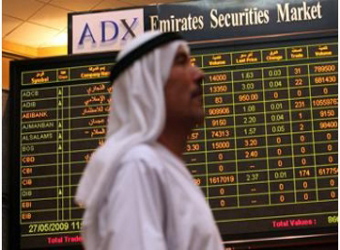Stock markets in the Gulf were mixed Thursday with Qatar and Dubai rising despite a decline in crude oil prices, while Saudi Arabia’s fall was cushioned by hopes it will be put on review for possible emerging market status next week.
Riyadh’s stock index fell 0.5 percent after Brent crude dipped below $47 a barrel; all but one of the 14 listed petrochemical producers fell, with National Industrialization Co (Tasnee) dropping 3.7 percent.
Jassim al-Jubran, senior equity analyst at Riyadh-based Aljazira Capital, said the stock market’s losses were relatively small because most funds had been moving into shares that would benefit from any decision by index compiler MSCI next Tuesday to place Riyadh on review for possible upgrade to emerging market status.
“Funds can withstand volatility in oil markets because they build long-term positions, and the MSCI review next week is higher on their list,” said Jubran.
The largest bank by assets, National Commercial Bank , added 0.8 percent after its board recommended a cash dividend of 1.1 riyal per share for the first half of the year, up from the 0.6 riyal paid out for the prior-year period.
The Saudi central bank responded to the U.S. Federal Reserve’s 25 basis point rate hike by lifting its reverse repo rate, at which commercial banks deposit money with the central bank, by the same amount to 1.25 percent but keeping its repo rate, used to lend money to banks, unchanged at 2.00 percent.
This is expected to be net positive for Saudi banks’ margins, but shares of other lenders were mostly lower on Thursday because the move had largely been priced in. Alawwal Bank fell 0.9 percent.
In Abu Dhabi, Dana Gas was the most heavily traded share, surging 7.4 percent. The stock has soared 78 percent since the start of the month in unusually heavy trade.
One Abu Dhabi-based stock broker, who declined to be named, told Reuters that he believed a strategic investor was building a position in the company.
The second most active stock, developer Aldar Properties , dropped 3.3 percent, dragging the index 0.8 percent lower.
The United Arab Emirates hiked key interest rates by 25 bps, which is expected to hurt companies with large debts. Aldar has outstanding total debt of 6 billion dirhams ($1.63 billion), with 1.12 billion due by the end of the year, according to its balance sheet.
In Dubai, Emaar Properties climbed 1.3 percent to 8.0 dirhams after Morgan Stanley raised the stock to “overweight” from “equal weight” with a price target of 10.80 dirhams, up 23 percent from the previous target price.
Emaar has been strong since it said two weeks ago it would spin off its local real estate unit and offer its shares to the public, giving the proceeds to its shareholders as a dividend.
The Dubai index closed 0.3 percent higher.
QATAR, EGYPT
Qatar’s index rose 0.7 percent, gaining for two days straight for the first time since June 5 when four Arab states including Saudi Arabia cut diplomatic and trade ties with Doha. The index is down 6.7 percent since that date.
Foreign funds, which usually account for between one-fourth and one-fifth of total market turnover, provided almost half of market turnover on Thursday. Although they were net sellers of Qatari shares, it was by a small margin as some bought shares on dips.
Some shares favoured by international funds surged, such as telecommunications operator Vodafone Qatar, which jumped 6.7 percent.
Qatari banks, which have been beaten down by the sanctions, were mixed. Large-cap Islamic lender Masraf Al Rayan fell 0.9 percent but Doha Bank rose 2.5 percent.
After the market close Doha’s central bank said it was raising its overnight deposit rates by 25 bps but it kept lending and repo rates unchanged – a move which should limit upward pressure on money market rates.
In Egypt, Ezz Steel rose 0.5 percent, outperforming the index, which fell 0.2 percent.
Late on Wednesday the country’s largest steel maker told Reuters it could raise its production of rebar to its maximum capacity of 4.6 million tonnes per year if tariffs on imported rebar continued.
Cairo imposed temporary tariffs on steel rebar from China, Turkey and Ukraine last week; they are set to last for four months, in order to protect local manufacturers hurt by imports.
Shares of the largest lender, Commercial International Bank , fell 1.0 percent.
HIGHLIGHTS
SAUDI ARABIA
* The index fell 0.5 percent to 6,821 points.
DUBAI
* The index advanced 0.3 percent to 3,459 points.
ABU DHABI
* The index fell 0.8 percent to 4,502 points.
QATAR
* The index rose 0.7 percent to 9,258 points.
EGYPT
* The index fell 0.2 percent to 13,479 points.
KUWAIT
* The index added 0.5 percent to 6,811 points.
BAHRAIN
* The index was flat at 1,327 points.
OMAN
* The index lost 1.0 percent to 5,248 points.
Source: Reuters


